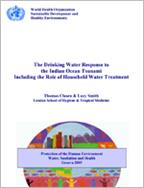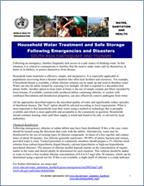Environmental health in emergencies
Emergency situations, including those due to natural hazards (e.g. earthquakes, hurricanes, floods, landslides, wildfires and droughts), technological hazards (e.g. chemical spills, disruption to infrastructure), complex situations (produced by conflict) and outbreaks, lead to health-related diseases and affect populations in all contexts. Depending upon the nature of the event, vulnerability of the people affected and capacity of local and national systems, deterioration in environmental conditions often results in a steep increase in WASH-related diarrhoeal disease. In particular, in emergencies WHO has the mandate to work with the Ministry of Health to ensure water quality and minimize water-related health risks and support provision of WASH in health care facilities.
Publications

Water and sanitation interventions to prevent and control mosquito borne disease: focus on emergencies
Climate change, conflict and human displacement are all growing in scale, increasing the spread of mosquito-borne diseases. A number of effective water,...

Infection prevention and control and water, sanitation and hygiene measures in health-care settings and...
Corrigenda, 5 March 2024The situation in the Gaza Strip is dire, with syndromic surveillance revealing high rates of infectious diseases. The risk of further...

Summary and policy implications Vision 2030 : the resilience of water supply and sanitation in the face...
The global climate is changing - drinking-water and sanitation services have to prepare for the impact.If the widely anticipated flood and drought consequences...

The drinking-water response to the Indian Ocean tsunami including the role of household water treatment
The 26 December 2004 tsunami devastated costal areas of eleven countries around the Indian Ocean. As part of an unprecedented emergency response, stakeholders...

Related links
Ebola virus disease
Provision of water and sanitation plays an essential role in protecting human health during all disease outbreaks, including the current Ebola Virus Disease (EVD) outbreak. Good and consistently applied water, sanitation and hygiene (WASH) practices, both in health-care settings and the community will further help to prevent human-to-human transmission of EVD and many other infectious diseases.

Safe management of health care waste practices play an essential role in protecting human health during all disease outbreaks, including during Ebola Virus...

Ebola Virus Disease (EVD): Key questions and answers concerning water, sanitation and hygiene
Provision of water and sanitation and good hygiene practices play an essential role in protecting human health during all disease outbreaks, including...
Related links
Cholera prevention and control
Cholera outbreaks can occur where water supplies, sanitation, food safety and hygiene practices are inadequate. Overcrowded communities with poor sanitation and unsafe drinking-water supplies are most frequently affected. It is estimated that there are between 1.4 and 4.3 million cases of cholera and 28,000 to 142,000 deaths each year. Provision of safe water and sanitation in communities and health care facilities is critical to control cholera and other waterborne diseases.
WHO supports technical risk assessments and solutions to improving water quality and related risks as well as sanitation and hygiene practices in cholera hot spot communities and during outbreaks. In addition, WSH is a member of the WASH Technical Group within the Global Taskforce on Cholera Control. The purpose of the Taskforce is to support increased implementation of evidence-based strategies to control cholera.
Fact sheets on hygiene education (emphasis on cholera control)
Health education and communication are essential components for the success of any programme to promote hygiene and prevent cholera. It is important to consider each stage of a programme to assess where uptake and effectiveness can be improved through a well chosen communication strategy. This series of Fact Sheets gives practical guidance on coping with health promotion issues within a cholera control programme.
Health promotion and hygiene education activities should be associated with measures aimed at providing a safe water supply, improving sanitation coverage, and enhancing food safety control.
The following fact sheets on hygiene education suggest activities to complement the overall planning and implementation of environmental sanitation, with particular emphasis on preventing and controlling cholera and other diarrhoeal diseases.
